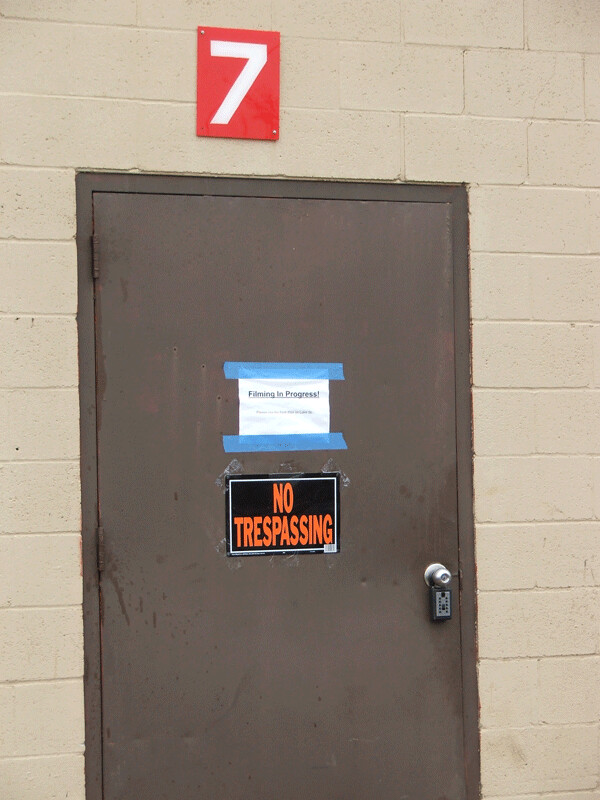Nosy reporters kicked out of Ironbound Studios

Over the past several weeks, local newspapers and TV stations have reported on The Harbinger, a $2 million movie being made at Ironbound Studios in Chisholm, Minnesota. Interior shooting for the movie is expected to wrap up in a week or so, with another couple of weeks of outdoor shooting to follow.
The movie is being financed by Veteran Films, a nonprofit company dedicated to providing work on movies to veterans, Native Americans, battered women, and others. According to producer Steven Reed, they hope to release The Harbinger within a year. Veteran Films also has another movie in pre-production—Saddle Up!, a Western musical comedy starring Kevin Pollak and Carl Reiner.
“We’re looking at doing that one in the fall, hopefully up here [at Ironbound],” Reed told me in a recent phone conversation. “And then we’re looking at doing The Harbinger 2 and 3 next spring up here also.”
The Harbinger is the first film to be made at Ironbound Studios. Located in a former ice rink in the basement of Chisholm City Hall, Ironbound was founded in 2014 by Wayzata businessman Gerald “Jerry” Seppala. Seppala had considerable help from Chisholm city officials and others on the Iron Range, who were dazzled by his promise that he would bring $70 million worth of film projects to Chisholm within two years. In his sales pitch, Seppala said that he wanted to position the studio to take advantage of the State of Minnesota’s Snowbate program, which offered incentives to people shooting movies in the state, as well as possible additional credits from the Iron Range Resources and Rehabilitation Board for shooting on the Iron Range.
Unfortunately, in 2016, Seppala and two Los Angeles men were charged with fraud in federal court. According to the indictment, they had conspired to swindle investors out of $12 million that was supposed to be used for making movies. They falsified bank statements, stole identities, and made fraudulent representations in pursuit of their scheme.
Seppala’s co-conspirators, James David Williams and Steven Brown, were accused of taking most of the money; of the $12 million, Seppala’s unlawful proceeds amounted to about $500,000.
On Sept. 21, 2017, James David Williams pled guilty to six felonies in federal court, including money laundering and wire fraud; facing a possible 92 years in prison, he will be sentenced in July.
The second conspirator, Steven Brown, also pled guilty; he faces a possible 20-year prison term, though under his plea agreement the government is asking for 5 years. Brown’s sentencing, too, will take place in July.
Brown and Seppala were connected through Griffin Productions, a movie production company that Seppala founded in 2012, with Brown as an investor. At the time, Seppala claimed they had one movie ready to go and a dozen more in the pipeline. “This isn’t going to be a one-off kind of production,” he told a thrilled reporter in 2012. “We hope to bring 10 to 12 projects that we have currently at Griffin Productions in pre-production within the next three to five years.”
Sadly, none of the movies ever materialized. When Seppala filed for personal bankruptcy in 2014, Griffin Productions ceased to exist. Seppala started Ironbound Studios three months later.
(Interestingly, Steven Brown is also connected to Donald Trump campaign adviser Rick Gates, who recently pled guilty to financial fraud and other crimes uncovered by the ongoing federal Mueller probe. Brown and Gates are business associates who pitched movies to potential Ukrainian investors. They share a lawyer, Walter Mack. The government is concerned that Mack’s involvement representing both men could constitute a conflict of interest, as either might have to testify against the other at some point. And I hope readers understand all that, because this is as far as I’m wading into THAT mess.)
On Dec. 5, 2017, Jerry Seppala pled guilty to one misdemeanor count of Conspiracy to Commit Bank Larceny. “I knew what I was doing was wrong and illegal, and I’m very sorry for the role I played,” he told the judge. He faces a maximum sentence of one year in prison, a $100,000 fine, or both. He will also be ordered to pay $1 million in restitution to the victims of the fraud. Seppala is scheduled to be sentenced in June.
I wrote about Ironbound Studios in 2016. Using the city of Chisholm’s business file on Ironbound as a source, I showed that city officials had done little to check out Seppala’s grand promises, and that the project depended more on political connections than hard reality to get done. I also found documents where Seppala had lied to the city or obscured the truth about certain things (for example, while he was pitching the project, he neglected to mention that he was a defendant in a civil fraud lawsuit in California). In the end, I concluded that there was plenty of blame to go around—Seppala should have been more honest in his dealings, and the city should have been more careful in theirs.
Though Ironbound Studios was not a part of Seppala’s fraud indictment, the company underwent a rocky period following his arrest. Cofounder Jeffrey Erb took over as president. For months, the space sat empty and locked. None of the movie contracts that Seppala had claimed to have in hand materialized. Ironbound fell behind on their rent and utilities and the city evicted them. They paid their rent and utilities, moved back in, and sued the city for unlawful eviction. That case is pending. Most disappointingly to the community, perhaps, they made no movies.

Today, however, Ironbound Studios is bustling with activity. The Harbinger is a real movie production paying real wages to real people. Ironbound’s current president, Joel McGuire, has expressed his intent to put Ironbound’s troubled past behind and boldly pursue projects that will provide much-needed employment on the Iron Range. The Harbinger is showing the industry what can happen at Ironbound, and McGuire hopes to build on the momentum.
Jerry Seppala is still involved with Ironbound Studios. He shows up in a TV shot here and a Facebook update there, lurking in the background in his nice suits. Unfortunately, nobody will say what he does. In a Duluth News Tribune story published on April 14, McGuire said that Seppala was not involved with Ironbound “from an operational standpoint.” The story failed to mention how he was involved.
On April 27, 2018, fellow Reader reporter Richard Thomas and I took a drive to Chisholm to visit Ironbound Studios.
A happening place
The reception area of Ironbound Studios, one flight down from the front doors of Chisholm City Hall, has chairs and office furniture scattered along the walls and a security guard posted behind a folding table in the middle. A large poster for The Harbinger hangs on the wall, and cardboard models of the movie sets are displayed on a side table. When Thomas and I arrived, we encountered half a dozen people circulating in and out of various offices, and heard somebody behind a heavy, closed door shouting, “Quiet on set!”
The guard wore a black ball cap and a white shirt emblazoned with the logo of Empire Security. He waved us over. I identified myself and told him that I hoped to speak with the movie’s director, Will Klipstine, and possibly get a look at the sets. I had spoken with Klipstine previously on the phone about the movie, though I hadn’t told him I was coming today. The guard directed me to a young woman with a clipboard, who said she would pass along my message when there was a break in the shooting.
Thomas wandered around the room snapping pictures, including a picture of Madeleine McGraw, a young girl with long dark hair who was sitting on a chair dressed in what appeared to be pink sleepwear and giraffe slippers. McGraw is a hard-working actor who has appeared in many commercials, TV shows and movies, including American Sniper and Cars 3. She gave Thomas a winning smile, which we will unfortunately be unable to share with readers, for reasons that will become clear.
The guard commented on the warm room and asked if we wanted water. When I said yes, he went away and came back with two bottles of water. I asked him if anyone from Ironbound Studios was around. He said the president of Ironbound, Joel McGuire, was around somewhere. He went off to find him, and they soon returned.
Joel McGuire was younger than I expected, maybe in his early thirties, with longish brown hair. I had never met or spoken with him, but I could see by his face that he had heard of me. My full and truthful telling of the Ironbound story in 2016 had convinced many people that I wanted to destroy Ironbound. Clearly, McGuire had gotten the message.
I jumped right in. “I’m just trying to ease my skepticism from those [early] days, and be fair to you guys as well. So how did you get involved?”
“In all honesty,” said McGuire, “you’re saying you have skepticism, and if you’re trying to write a story that is negative to what I’m trying to do here, for me to get involved with something like that…”
“Is Jerry involved with Ironbound?”
“I’m just gonna say no comment right now,” said McGuire. “I mean, I get that you’re trying to make a story, probably trying to build off the last one, but, I mean, there’s some stories where it made it difficult for what we’re trying to do here. And I get that you’re trying to do your job, but we have stuff we’re trying to do … I mean, the good things to write about here are the production that’s happening.”
“Everybody’s getting paid, there’s action going on,” I agreed. “None of this was the case before, and now it is the case. To me, that’s a positive step. Absolutely. And I would not want to say otherwise.”
“Well, I don’t think you have a reason to say otherwise.”
“So how long have you been with them?”
“About 18 months.”
“Oh, that long? … You were doing film before this?”
“No, I was doing business development and marketing, which, again, was a challenge when I came in. So, I mean, I’m not gonna go out of my way to have conversations that could potentially make my job more difficult, and what we’re trying to do here more difficult … You’re trying to sensationalize it.”
“You gotta understand,” I said, “for the first part of Ironbound, [the message was] tens of millions of dollars are gonna be coming to town, for two years straight, in interviews, on the radio, in newspapers. And then that all disappeared. It was built on nothing.”
That got him. “It was not built on nothing. I’m still talking to some of the projects that existed back then! If you understand anything about the film business, these projects are very fluid … The projects that he was speaking with, I’m still in communication with some of them, and we’re still trying to get them here.”
“Can you just tell me, does he work for Ironbound?”
“I’m just gonna say no comment.”
“All right, all right.”
“And, honestly, it’s neither here nor there.”
“Well, it is, to wrap up the loose end.”
“For you! For your story!”
“Right. Well, yeah.”
“That’s not my business!”
As one might imagine, things didn’t improve much after that. I didn’t see what the big deal was. It was fine with me if Jerry Seppala was working there. I just wanted to know.
“I don’t like you showing up here uninvited,” said McGuire.
“What do you mean, showing up here? I can come to the desk.”

A second security guard arrived on the scene—dark jacket, dark hair, jutting jaw. This was Paul Gherardi, founder and president of Empire Security. He began to interrogate me. “Did you tell the security guard your intent when you walked through here?”
A few minutes followed during which Gherardi asked me more questions and wrote down my answers.
McGuire, meanwhile, took offense at Thomas’s picture-taking. “Excuse me, sir. I didn’t give you permission for those photographs.”
“City Hall,” said Thomas. “Public property.”
“No, it’s private property! It’s private property!” McGuire and Gherardi both shouted.
“Ask the city attorney! I did,” Gherardi continued impressively.
A few more minutes passed while all the legal experts in the room hashed it out amongst themselves. If Ironbound was concerned about people taking pictures, they had an odd way of showing it—they had been giving nonstop media tours through the facility for the past several weeks. And for the first hour that we had been hanging around, snapping pictures left and right, nobody had said a word. Nevertheless, if McGuire said he didn’t want pictures of his company published, I was inclined to honor that request—at least for the interior of the building—simply out of politeness.
Eventually, the argument wound down, and everybody was left standing around looking at each other. “We’d like you to leave the building,” Gherardi said.
“Thanks for the water,” I said to the first security guard.
“You bet.”
And we left.
As for Jerry Seppala, I have spoken with him once. On April 27, I dialed his number and he answered. When I identified myself, he said, “I have no comment for you, John,” and hung up.